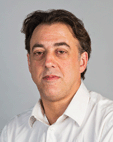DOI: 10.1039/C2CC90246J
(Profile)
Chem. Commun., 2012, 48, 8616-8616
Interview with Dominic Wright
| ||||||
Do you remember what it felt like to publish your first ChemComm article?
I remember it very well. I was extremely excited about publishing in the flagship RSC journal. I still get very excited about papers being accepted in ChemComm but I don't send members of my family reprints any more like I did the first time (very sad, I know).How has your research evolved from your first to your most recent article?
My first ChemComm was published as a PhD student with Ron Snaith (who sadly passed away in 2000). My entire focus at that stage was on lithium and the alkali metals. I think that most of all I am now interested in a far greater range of elements (transition metal as well as p-block elements) than I was and most excited by new types of reactivity these days, rather than having a specific focus on one area of the periodic table.What do you like most about publishing in ChemComm?
The short punchy style of ChemComm is still among the best formats of any communications journal. The RSC template also works the best of all of the major journals and the publications times are extremely rapid.What aspect of your research are you most excited about at the moment?
For a number of years inorganic chemistry (and in particular inorganic synthesis) has been the poor relative of organic chemistry. Now, however, with the focus on materials, synthetic inorganic chemists have fantastic opportunities to practise their art and really influence the direction of modern chemistry at the cutting edge. I suppose that if I was forced to make a choice, I would say that I am most excited by the potential of main group metals in synthesis and catalysis and the applications of heterometallic complexes as single-source materials for the deposition of new catalytic materials.What is the best part of your job?
The best part of my job is the absolute freedom I have to choose the direction of my research.What is the secret to success in scientific publishing?
I really am not sure about the answer to this one because success in scientific publishing can mean so many different things to different people (for example, where you publish, how much you publish or how many times work is cited). I can only say that I have aimed as far as I can when writing papers to be direct and clear about what I am saying but most of all I've tried to judge carefully before I submit any paper where the paper would be best being published (in terms of the quality of the results and what the readership you are aiming at is).What is your advice to young emerging scientists?
Try to focus as much as you can on really original ideas and don't follow the crowd.What do you do in your spare time?
I swim a lot (badly), grow vegetables in my allotment (quite well) and play my guitar (terribly).By the time I'm 100 I would like to have...
…a cottage on the North Norfolk coast.| This journal is © The Royal Society of Chemistry 2012 |

